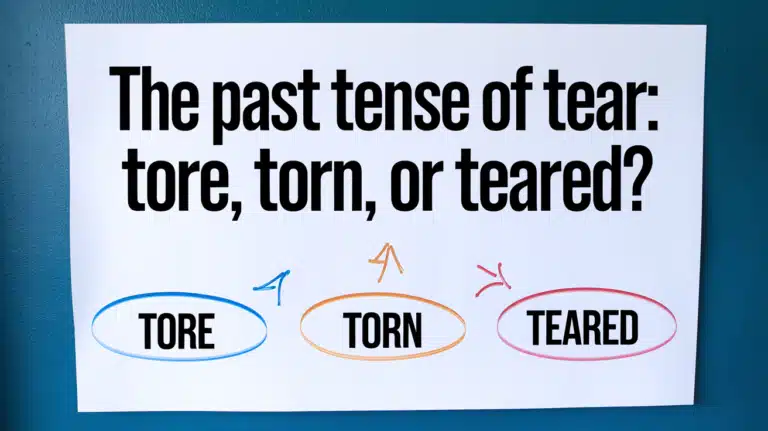Mastering the Past Tense of Meet: A Comprehensive Guide to English Verb Tenses
In the world of English grammar, understanding the past tense of meet is crucial for effective communication. This guide will dive deep into the nuances of this irregular verb, exploring its forms, usage, and common pitfalls. Whether you’re a language learner or a native speaker looking to brush up on your grammar skills, this article will help you navigate the complexities of English verb tenses with confidence.
The Evolution of “Meet”: From Old English to Modern Usage
The word “meet” has a rich history, rooted in Old English word origin. It derives from the Old English “metan,” which meant “to find, find out; fall in with, encounter; obtain.” Over time, its meaning has evolved, but the core concept of coming together or encountering has remained.
“Language is the road map of a culture. It tells you where its people come from and where they are going.” – Rita Mae Brown
This quote beautifully illustrates how understanding the origins of words like “meet” can provide insights into our cultural evolution.
Breaking Down “Meet”: Present Tense Forms and Uses
Before we delve into the past tense, let’s examine the present tense forms of “meet.” Understanding these forms is essential for grasping the conjugation of meet in various contexts.
| Tense Form | Conjugation |
|---|---|
| Simple Present | I/You/We/They meet, He/She/It meets |
| Present Progressive | I am meeting, You/We/They are meeting, He/She/It is meeting |
| Present Perfect | I/You/We/They have met, He/She/It has met |
The usage of meet in present tense is versatile. For example:
- “I meet my friends every Friday.” (Simple Present)
- “She is meeting her new boss today.” (Present Progressive)
- “They have met all the project requirements.” (Present Perfect)
Mastering “Met”: The Past Tense of Meet
Now, let’s focus on our primary topic: the past tense of meet. “Met” is the correct past tense form, and it’s classified as an irregular verb because it doesn’t follow the standard “-ed” ending rule.
Read More About : Mr., Mrs., Ms., and Miss – Full Form and Meaning
Here’s a breakdown of the past tense forms:
- Simple Past: I/You/We/They/He/She/It met
- Past Progressive: I/You/We/They were meeting, He/She/It was meeting
- Past Perfect: I/You/We/They/He/She/It had met
The usage of met in past tense is straightforward once you’ve memorized the irregular form. For instance:
- “We met at the coffee shop yesterday.”
- “She was meeting clients all day last week.”
- “By the time I arrived, they had already met the new team members.”
Common Mistakes and How to Avoid Them
One of the most common errors when dealing with the past tense of irregular verbs is using the non-existent form “meeted.” Remember, “met” is both the simple past and past participle form of “meet.”
To avoid confusion, practice using “met” in various contexts:
- ✅ “I met her last summer.”
- ❌ “I meeted her last summer.”
Another point of confusion can be the similarity between “meet” and “mete,” which means to distribute or allot. Always double-check your usage to ensure you’re using the correct word.
Pronunciation Guide: Saying “Met” Like a Pro
The pronunciation of met is relatively simple, but it’s worth noting for non-native speakers. It’s pronounced as /met/, rhyming with “bet” or “set.”
Pro tip: Practice saying “I met my mate at the mat” to perfect your pronunciation of short ‘e’ sounds.
“Meet” and “Met” in Action: Real-world Examples
Understanding the meet vs met grammar distinction is crucial for effective communication. Let’s look at some real-world examples:
- Business context:
- “We meet every Monday for team updates.” (Present tense)
- “We met with the investors last quarter.” (Past tense)
- Social context:
- “I’m meeting Sarah for lunch tomorrow.” (Present progressive)
- “I met my best friend in college.” (Simple past)
- Idiomatic expressions:
- “Let’s meet halfway on this issue.” (Figurative use)
- “He finally met his match in the chess tournament.” (Idiomatic past tense)
Beyond “Meet”: Exploring Synonyms and Related Terms
To enrich your vocabulary, it’s helpful to explore synonyms of meet and synonyms of met. Here are some alternatives:
Synonyms of meet (Present Tense):
- Encounter
- Convene
- Assemble
- Gather
- Rendezvous
Synonyms of met (Past Tense):
- Encountered
- Convened
- Assembled
- Gathered
- Rendezvoused
Using these synonyms can add variety to your writing and speech, making your English more dynamic and engaging.
The Future Perfect: Looking Ahead with “Will Have Met”
While we’ve focused on the past tense, it’s worth touching on the future perfect tense: “will have met.” This tense is used to describe an action that will be completed before a specific point in the future.
Example: “By this time next year, I will have met all my financial goals.”
Understanding this tense completes your grasp of the verb conjugation rules for “meet” across all time frames.
“Meet” in Different Contexts: Business, Social, and Digital
The way we use “meet” and “met” has evolved with technology. In the digital age, we often use these terms in the context of virtual interactions:
- “Let’s meet on Zoom at 3 PM.”
- “We met through an online dating app.”
This evolution shows how language adapts to our changing world, while maintaining its core meaning.
Quiz: Test Your “Meet” and “Met” Knowledge
Let’s reinforce what we’ve learned with a quick quiz:
- What’s the past tense of meet?
a) Meeted
b) Met
c) Meted - Which sentence is correct?
a) I have meeted my goals.
b) I have met my goals.
c) I have meet my goals. - What’s the present progressive form of meet?
a) I am meet
b) I am meeting
c) I am met
(Answers: 1-b, 2-b, 3-b)
Conclusion: Confidently Using “Meet” and “Met”
Mastering the past tense of meet and its various forms is a significant step in enhancing your English language skills. Remember:
- “Meet” is an irregular verb
- “Met” is the correct past tense and past participle form
- Practice using “meet” and “met” in various contexts to solidify your understanding
By understanding the nuances of English verb tenses and the specific rules for “meet,” you’ll communicate more effectively and confidently in both written and spoken English.







